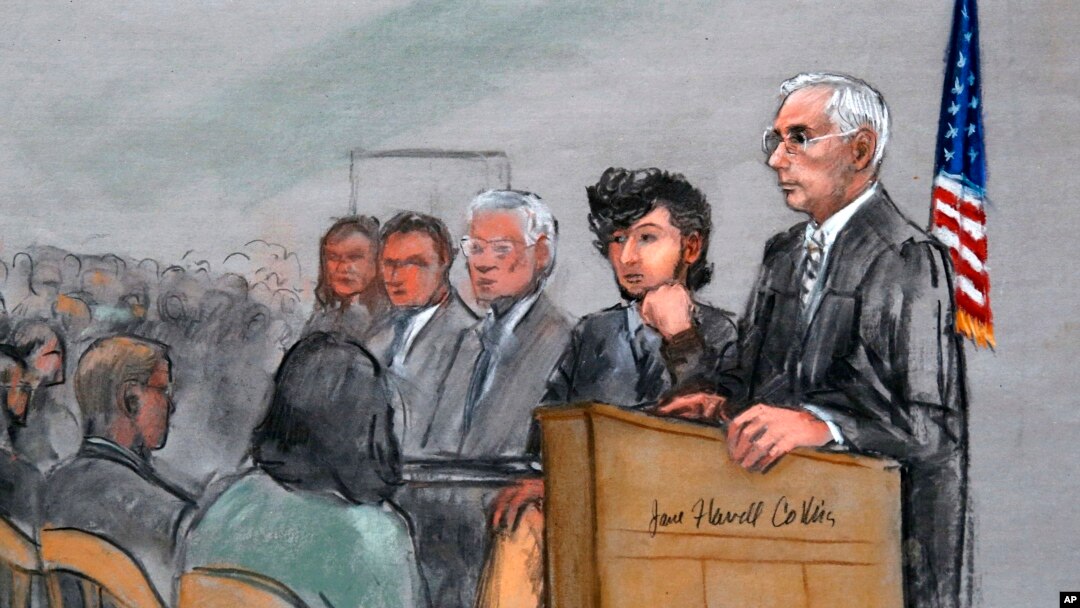With opening arguments scheduled to begin Wednesday in the Boston Marathon bombing trial, prosecutors have made a strong case in pre-trial evidentiary filings tying the lone survivor, Dzhokhar Tsarnaev, to the blasts that killed three and maimed scores.
If prosecutors can persuade a jury that Tsarnaev is guilty, however, it’s an open question whether jurors can be convinced that he deserves death, experts said.
“Executions are hard to get at because of a lot of related issues. Because the length of appeals, lethal injection is causing a lot of problems now,” said Richard Dieter, of the non-profit Death Penalty Information Center in Washington D.C. “We have a lot of states that don’t have the death penalty, so it is not a consensus in our country.”
The jury selection process alone, which took two months to complete, underscores the difficulties of a death penalty trial. Prosecutors and defense lawyers sparred repeatedly in front of U.S. District Judge George O’Toole trying to winnow the initial pool of more than 1,300 down to 18: 12 jurors plus six alternates.
Citing public opinion in Massachusetts, defense lawyers argued that it was impossible to seat an impartial jury, never mind one that would not be automatically committed to executing Tsarnaev. Last week, the court finished up the selection process, and set opening arguments for March 4.
Defense lawyers have also sought to have the trial moved out of state, arguing again that the jury in Massachusetts will not be impartial. A federal appeals court on Friday rejected that request.
The legal skirmishing is being held at Boston’s federal courthouse, just a few miles from the finish line of the Marathon, where two pressure-cooker bombs exploded on April 15, 2013.
A massive manhunt four days later shut down many towns in the greater Boston area before police captured a wounded Tsarnaev. His older brother, Tamerlan, was killed in the hunt.
Federal prosecutors petitioned U.S. Attorney General Eric Holder for the death penalty. Holder, who openly opposes capital punishment, last year agreed, stating: “The nature of the conduct and the resultant harm compel this decision.”
Death penalty history
Capital punishment resumed in the United States in 1976, after a Supreme Court-ordered hiatus. While many states have executed inmates since that time, the federal government has tried and executed only three people: Oklahoma City bomber Timothy McVeigh, drug smuggler Juan Raul Garza, and kidnapper Louis Jones.
Currently, 61 federal prisoners are on death row in the United States; some have been on for more than 15 years, as various appeals make their way through the courts.
By contrast, the state of Texas-- one of 32 states that allows for capital punishment-- has executed 72 people since 2010 alone. Massachusetts state law does not allow for the death penalty.
“This was aimed at this symbolic national event,” Dieter said. “And then of course there are some international potential to -- you know, who are the defendants? Where are they from? Why did they do this— that I think evoke federal concerns.”
Tsarnaev has pleaded not guilty to the 30 charges he faces, and his lead lawyer, Judy Clarke, has made a name for herself in federal death penalty cases -- gaining life in prison for her clients instead of execution. Clark is known for masterfully humanizing her clients in the courtroom and softening up the jury during the guilt or innocence phase, experts said.
“Mr. Tsarnaev has hit a gold mine by having Judy on his side,” said Jon Katz, a criminal defense lawyer who has met and admired Clarke for many years. “I doubt he could do any better.”
“When a jury remembers that every single criminal defendant starts as an innocent baby, has a beating heart, has blood running through their veins, the jury has less trouble realizing this is not a monster,” Katz said.
Once underway, the trial should unfold in two phases. The first will determine guilt or innocence for Tsarnaev for the 30 charges, not all of which mandate the death penalty. During the second phase, the same jury will decide whether he should be executed or face lesser punishment.
The death penalty requires a unanimous vote from all 12 jurors.
“The country I guess was waiting for a response from Washington. What are you going to do so that this never happens again?” Dieter said. “I am not sure that the death penalty succeeds in accomplishing that, but it is a response.”


